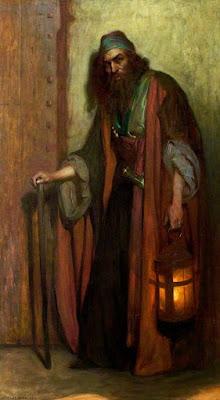Trigger Warnings or General Guidance on Content, Theatre Audiences
The theatre behind a new production of The Sound of Music is facing criticism for its use of a trigger warning to caution audiences that it touches on "Nazi Germany and the annexation of Austria".
Chichester Festival Theatre, where the revival of the stage show opens next week, is warning prospective ticket buyers that some of them "may find certain themes distressing"...
 |
| Arthur Bourchier (1863-1927) as Shylock Charles A. Buchel (1872-1950) Photo Credit: Royal Shakespeare Company Collection [CC BY-NC-ND] |
It is the latest example of a cultural institution using trigger warnings, or content notes as they are sometimes referred to, to tell people in advance about difficult subject matter they might encounter.
The write and broadcaster Rabbi Jonathan Romain ... described such warnings as "incredibly patronising". He said they did a "disservice" to the audience.
Earlier this year, the actress Tracy-Ann Oberman, who is Jewish, explained why her production of The Merchant of Venice, unlike that staged at the Globe Theatre's Sam Wanamaker Playhouse last year, would not contain any trigger warnings.
The Shakespeare play contains several antisemitic tropes and audiences attending the Globe production were warned it was one of the Bard's "most problematic". The Globe has also added warnings to other Shakespeare plays such as A Midsummer Night's Dream, telling theatregoers that the 400-year-old comedy contained "language of violence, sexual references, misogyny and racism..."
Oberman ... said theatre was supposed to be challenging. "You're meant to feel emotions that feel uncomfortable, but in the safe environment of the theatre. You're meant to feel fear, pity, anger, upset, horror, outrage ... it's meant to be able to change you."
(Constance Kampfner, The Times, 2023)
The spokeswoman for the Chichester Festival Theatre said that it gave general guidance on content and themes but that these were not trigger warnings. However, The Young Vic, in London, warned audiences that Further than the Furthest Thing contained "strong language, themes of climate displacement and xenophobia, and depictions of pregnancy and infant homicide." It also warned audiences that "cooked eggs are handled during the show."
At Queen's University Belfast students were told that Macbeth contained blood whilst Richard 111 was said to feature "ghosts which might be scary".
Theatre Audiences
 |
Despair, Eric Harald Macbeth Robertson (1887-1941) Photo Credit: Glasgow Museums [CC BY-NC-ND] |
…The policy will bring accusations of indulging politically correct, over sensitive parts of society, something denied by the theatre’s executive producer, Henny Finch. “I don’t think we’re pandering,” she said. “I think it is just about being considerate to all audiences, making sure everybody feels comfortable and making the theatre as accessible as possible.
…there are five specific advisories for its new production of David Greig’s Europe, which opened last week. They include: “In the first half of the play, a man repeatedly places his hand on a woman’s leg, to her discomfort.”
“In the second half of the play, a man beats up another man due to his status as a migrant.”
“in the second half of the play, a man describes a violent attack on a woman.”
”Hopefully, they give people enough information about whether they want to prepare themselves for a show, or decide whether or not they want to come,” she [Finch] said. “I think the world is changing and audiences expect different things, and we have to be responsive to that in the theatre.”
The move could be seen as mirroring the “trigger warnings” that are increasingly used by universities and colleges to warn or shield students from potentially disturbing content.
The theatre critic Mark Shenton, president of the Critics’ Circle said the move was a step too far. “Theatre is all about surprise, and by accommodating the sensitivities of some of its audience it could be ruining that surprise. You can’t protect people from everything. It will ruin the theatre.”
(The Guardian, 2019)
*Theatre at its best aims to be entertaining, unpredictable and ground-breaking.
Unexpected moments and plot twists hold the audience’s attention, prompting people to ponder bigger questions and perhaps even shift uncomfortably in their seats as they do so. This must come as news to those running London’s Donmar theatre who see it as their role to guard against causing any potential distress to members of the audience or showing anything on stage that might trigger challenging emotions.
…But isn’t the point of a play sometimes to take people out of their comfort zone? Isn’t the surprise effect – an essential component of any good drama – ruined by such trailing of specific content?
…This pandering to the smallest likelihood of offence is blighting modern culture, with “trigger warnings” commonplace. Universities routinely use them to warn students of content they might find upsetting. Twitter is dominated by people expressing fake outrage over something because it is deemed to have hurt their feelings.
It isn’t the job of theatre producers to police everything for the audience, even in this hypersensitive age: causing offence is part and parcel of any good drama.
(Jawad Iqbal, The Times,2019)
Comments
Post a Comment